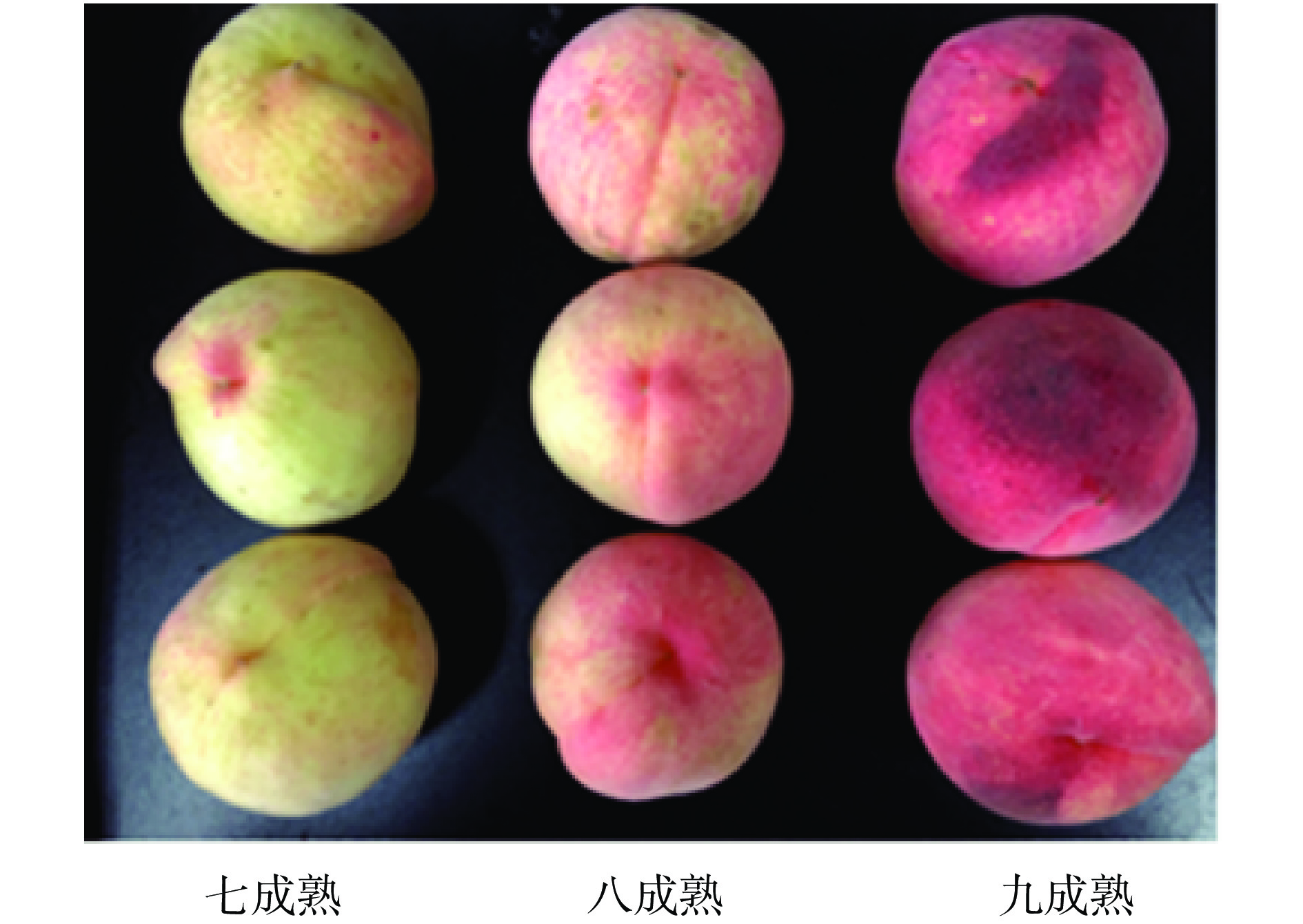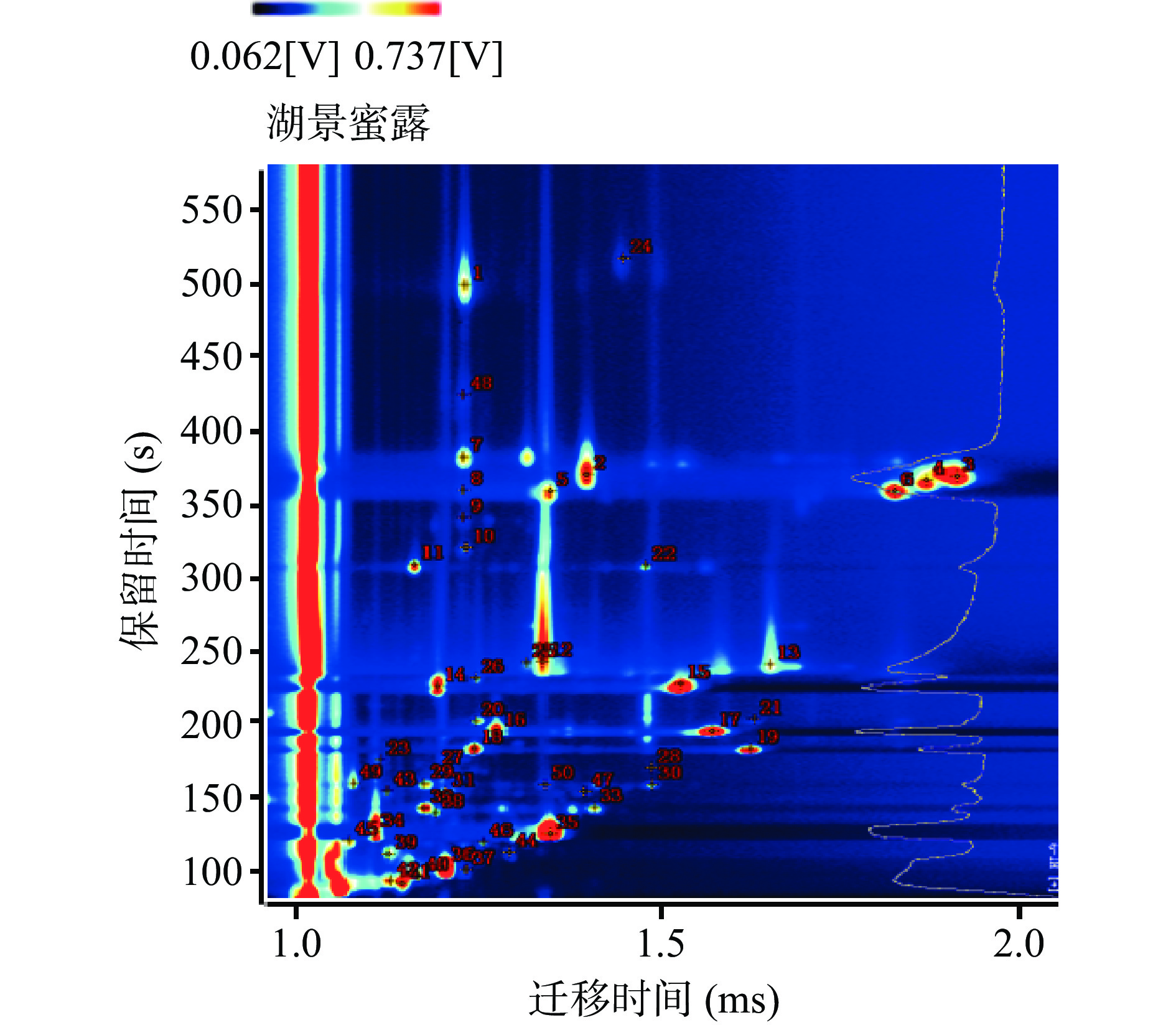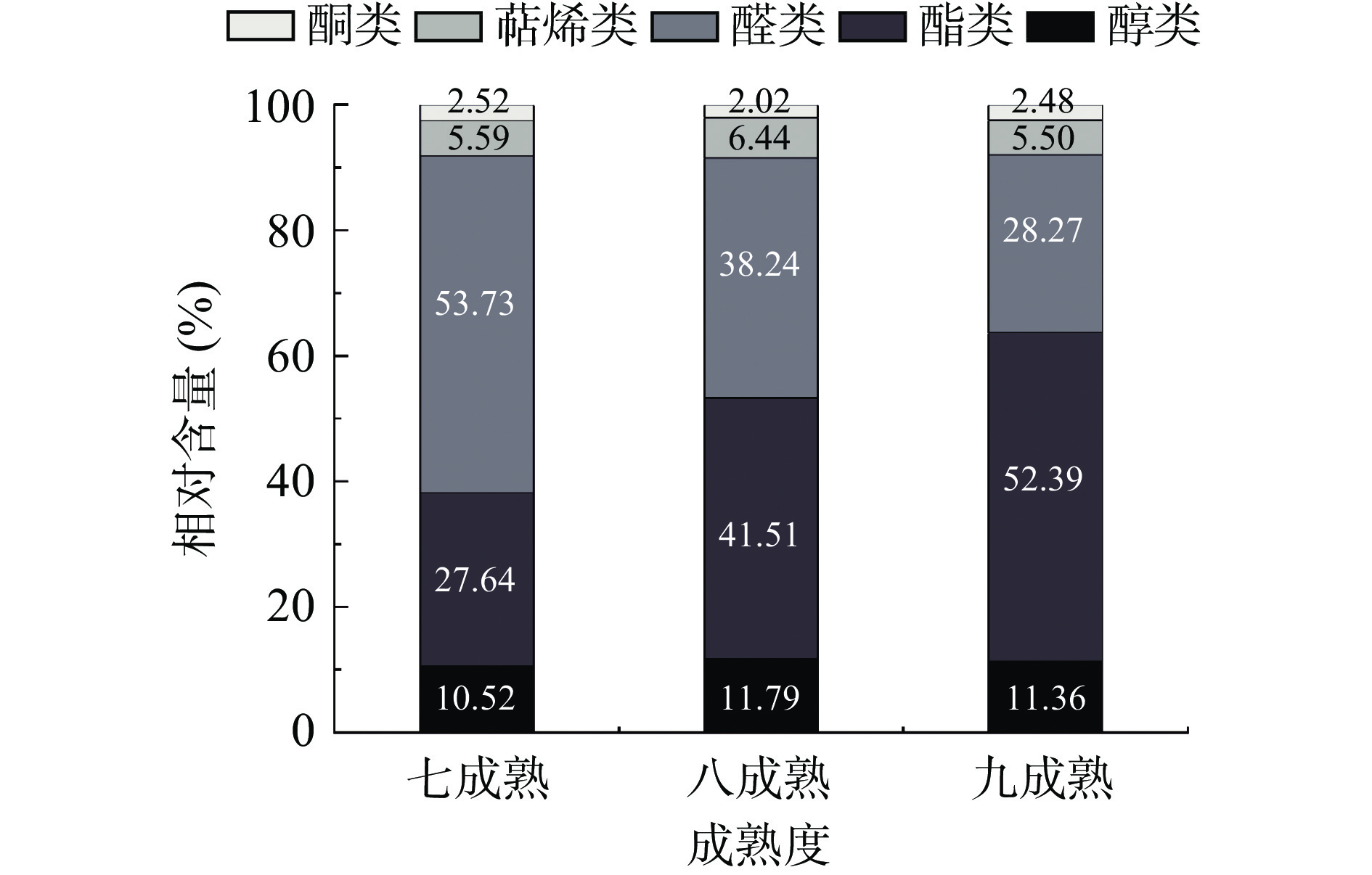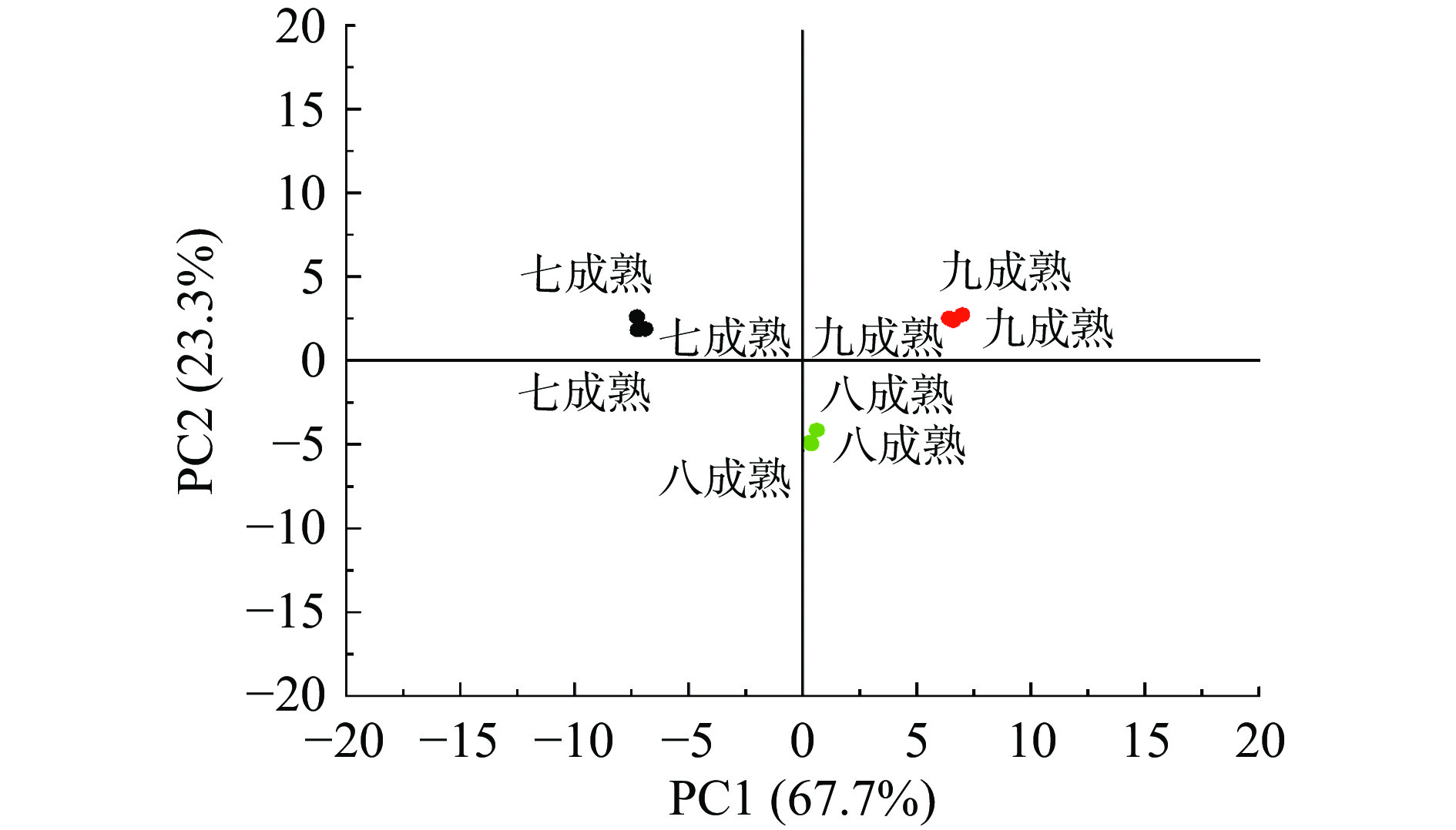Flavor Evolution of Honey Peach Juice Based on Raw Material Maturity
-
摘要: 成熟度是影响水蜜桃果汁风味的关键因素。本文以“湖景蜜露”水蜜桃为试材,借助高效液相色谱和气相色谱-离子迁移谱等技术,探究了不同成熟度水蜜桃原料加工果汁的风味变化及差异。结果表明,蔗糖和苹果酸为水蜜桃成熟过程的主要积累成分。七成熟果汁总糖、总酸含量最低;八成熟果汁的总糖(112.58 mg/g FW)、甜度值(99.40)、糖酸比(15.57)、甜酸比(13.74)相对较高,酸甜风味浓郁,此阶段醇类相对含量较高(11.79%),赋予果汁较高的果香和甜香;九成熟果汁的甜度值(93.35)、糖酸比(13.38)、甜酸比(11.93)均最低,酯类含量随着成熟度的升高而增加,醛类含量趋势则相反。主成分分析表明,八成熟果汁的酸甜适宜,果香、花香味浓郁,适宜加工高品质果汁。本研究为基于天然风味的水蜜桃果汁研发提供理论和数据支撑。Abstract: Fruit maturity is a major factor associated with the final juice’s flavor quality. To explore the flavor changes and differences of the honey peach juice processed from different maturities, ‘Hujingmilu’ honey peaches from three different maturities were selected for the study. Flavor profiles of honey peach juice with different maturities were separated and identified by high-performance liquid chromatography (HPLC) and gas chromatography-ion mobility spectrometry (GC-IMS). The results showed that sucrose and malate were the major accumulation forms in mature fruits. 70% maturity fruit juice had the lowest total sugar and total acid content. The total sugar (112.58 mg/g FW), sweetness value (99.40), sugar-acid ratio (15.57), and sweet-acid ratio (13.74) of the 80% maturity fruit juice were relatively high, and the sweet and sour flavor was strong. Meanwhile, the relative content of alcohol (11.79%) in 80% maturity fruit juice was higher, giving the juice a strong fruity and sweet aroma. The sweetness value (93.35), sugar-acid ratio (13.38), and sweet-acid ratio (11.93) of the 90% maturity fruit juice were the lowest. As the maturity increased, the ester content gradually increased, while the aldehyde content gradually decreased. The principal component analysis showed that 80% maturity fruit juice was suitable for processing high-quality honey peach juice, with a suitable sweet-sour taste, and strong fruity, floral aromas. This study provides theoretical and data support for the research and development of honey peach juice based on natural flavor.
-
水蜜桃(Amygdalus persica ,Honey peach)是浙江省助农增收的重要产业之一,其中‘湖景蜜露’(Prunus persica L. Batsch cv Hujingmilu)是最具代表的品种之一。‘湖景蜜露’为中晚熟水蜜桃品种,因其丰产稳产、果大、外观艳丽、品质优、耐贮藏等,深受果农和消费者喜爱[1]。
水蜜桃属于呼吸跃变型果实,采后易受内源酶及微生物的影响发生腐烂变质,给水蜜桃贮藏和销售带来极大困难,发展水蜜桃深加工产品可以有效延长货架期,避免损失,而目前桃加工产品以桃汁为主方向[2]。当前人们对水蜜桃果汁的研究主要集中在工艺优化[3]、杀菌[4]及贮藏[5]等对其品质及风味的影响上,而对其加工原料成熟度的筛选鲜有报道。风味作为果实的重要品质之一,主要由糖、酸和挥发性风味物质组成,对桃果汁品质有重大影响,而成熟度又是影响桃果实风味的关键因素之一,其生长成熟的不同阶段对其糖酸、挥发性化合物等风味有不同程度影响。沈志军等[6]对水蜜桃发育过程中主要糖、酸含量变化进行了分析,明确了水蜜桃成熟过程中糖、酸风味的变化规律;Rizzolo等[7]利用电子鼻和高效液相色谱对桃果实风味物质进行测定以评估其成熟度等级;Ceccarelli等[8]研究表明,不同成熟度对桃果实贮藏期风味变化有不同影响,为基于成熟度的无创测量调整贮藏时间来控制水蜜桃风味提供了可能。前期文献研究仅对不同成熟度桃果实中的风味进行了测定,主要目的是为了明确桃果采后贮藏过程中的风味变化及推进桃果实的优化育种选配工作,然而,关于不成熟度水蜜桃的加工原料筛选,尤其是风味特性,还未进行全面探究。原料成熟度对高品质果汁加工有很大影响,因此充分了解不同成熟度水蜜桃果汁的风味差异对于原料选择有重要意义。
本研究以“湖景蜜露”水蜜桃为试材,利用高效液相色谱(High Performance Liquid Chromatography, HPLC)和气相-离子迁移谱(Gas Chromatography-ion Mobility Spectrometry, GC-IMS)技术对不同成熟度水蜜桃的糖、酸与挥发性风味物质(Volatile Organic Compounds, VOCs)进行分析鉴定,从而得到不同成熟度水蜜桃的风味变化,筛选出最适宜制汁的成熟度,为水蜜桃果汁加工原料筛选提供理论和应用依据。
1. 材料与方法
1.1 材料与仪器
七成熟(果实底色为绿色,已充分发育,但茸毛厚、多)、八成熟(底色变淡,变粉红,果面丰满,毛茸稍稀,果实仍较硬)、九成熟(果皮粉红色,弹性增大,有芳香气味,果面着色充分)的湖景蜜露水蜜桃(图1) 浙江省宁波市奉化区。
蔗糖、果糖、山梨醇、葡萄糖、鼠李糖、麦芽糖、草酸、酒石酸、琥珀酸、富马酸、丙酮酸、柠檬酸、奎宁酸、苹果酸、莽草酸 标准品及试剂均为色谱纯,上海源叶生物科技有限公司。
LC-100型液相色谱仪(配Shodex RI-201H示差检测器、Dikma Polyamino HILIC(250 mm×4.6 mm,5 μm)) 上海伍丰科学仪器有限公司;LC-20AT型液相色谱仪(配SPD-20A紫外检测器、C18反相色谱柱(150 mm×4.6 mm,5 μm)) 日本岛津;FlavourSpec®气相-离子迁移谱 德国G.A.S.公司。
1.2 实验方法
1.2.1 样品制备
将原料洗净、去核、随机取样,液氮冷冻研磨为粉末后进行糖、酸风味待测;将原料洗净、去核、随机取样后置于原汁机中榨汁,用50 mL离心管收集后液氮冷冻处理,−80 ℃冷藏VOCs待测。
1.2.2 糖组分的测定
参考赵爱玲等[9]的方法,略有修改。用HPLC(LC-100型)进行糖组分测定。提取:称取约0.2 g样品,加入1.5 mL 40%乙腈水溶液,进行研磨提取,然后室温超声30 min,冷却后定容1.5 mL,12000 r/min,离心10 min,针头式过滤器过滤后待测。测定:流动相为60%乙腈水溶液;进样量10 μL,流速1 mL/min,柱温30 ℃,示差检测器温度40 ℃。相同检测条件下,根据样品峰面积与标准曲线计算各糖组分含量(mg/g FW)。总糖含量为各单糖含量总和,总糖含量(mg/g FW)=鼠李糖+果糖+山梨醇+葡萄糖+蔗糖+麦芽糖。
1.2.3 甜度值计算
甜度值=果糖×1.75+葡萄糖×0.7+蔗糖×1.00+鼠李糖×0.33+麦芽糖×0.5+山梨醇×0.4,参照姚改芳等[10]的公式计算。
1.2.4 有机酸组分的测定
参考皮小弟等[11]的方法,略有修改。用HPLC(LC-20AT型)进行有机酸的测定。提取:称取0.2 g样品,加入1.5 mL 80%甲醇水充分研磨,45 ℃超声提取30 min,12000 r/min 4 ℃离心10 min,取上清液,加入1 mL流动相溶液涡旋振荡溶解,针头式过滤器过滤后待测。测定:流动相为0.1%磷酸水溶液,pH为2.7;进样量10 μL,流速0.7 mL/min,柱温30 ℃,紫外波长210 nm。相同检测条件下,根据样品峰面积与标准曲线计算各酸组分含量(μg/g FW)。总酸含量为各单酸含量总和,总酸(mg/g FW)=草酸+苹果酸+奎宁酸+莽草酸+柠檬酸+酒石酸+丙酮酸+琥珀酸+富马酸。
1.2.5 糖酸比、甜酸比的计算
糖酸比=总糖/总酸;甜酸比=甜度值/总酸。
1.2.6 风味成分分析
根据Leng等[12]的方法选用FlavourSpec®风味分析仪进行“湖景蜜露”水蜜桃的风味分析,略有修改。顶空孵化温度:30 ℃;时间:10 min;转速:500 r/min;进样针温度:65 ℃;进样量:500 μL,不分流模式;清洗时间:0.50 min;色谱柱温度60 ℃,运行时间20 min,载气为高纯氮气(≥99.999%);设置程序:流速2.00 mL/min,并保持2 min,在20 min内线性增至100.00 mL/min。IMS条件:温度45 ℃;流速150.00 mL/min。将顶空进样瓶中的样品进行孵化,使用加热的进样针抽取瓶内的顶空组分,进行GC-IMS分析测定。
1.3 数据处理
采用IBM SPSS Statistics 26软件对数据进行统计分析和显著性差异分析,处理三个平行数据并将其最终表示为平均值±标准偏差。采用Origin8.0软件进行图表绘制。采用GC-IMS仪器配套的分析软件Laboratory Analytical Viewer(LAV)、Reporter、Gallery Plot等插件分别显示二维谱图、指纹图谱。利用NIST和IMS数据库对挥发性成分进行定性分析。根据面积归一化法得到各成分在水蜜桃果汁挥发性组分中的相对含量。
2. 结果与分析
2.1 成熟度对水蜜桃果汁滋味组分的影响
2.1.1 成熟度对水蜜桃果汁糖组分含量的影响
糖是水果食用品质的主要组成部分,甜度的强度取决于总糖含量以及糖的性质[13]。由表1可知,不同成熟度水蜜桃中的糖组分含量存在差异。各成熟度桃汁中的主要糖组分均为蔗糖,占总糖的55.16%~64.10%,是水蜜桃重要的甜味剂[14-15]。随着成熟度的上升,蔗糖呈逐渐下降趋势,其含量由64.89 mg/g FW下降至59.28 mg/g FW,表明在成熟后期蔗糖被逐渐水解。随着成熟度的增加,果汁中的鼠李糖、麦芽糖含量呈上升趋势,而果糖含量则趋于稳定。此外,八成熟果汁的甜度最高,且八成熟果汁中的葡萄糖含量分别为七、九成熟的1.21和1.69倍,为果汁提供高甜度的同时,高葡萄糖含量使果汁不乏香甜绵软之感,风味浓郁。
表 1 不同成熟度水蜜桃汁糖组分含量变化Table 1. Changes of sugar components in peach juice with different maturity糖含量
(mg/g FW)成熟度 七成熟 八成熟 九成熟 鼠李糖 6.07±0.16b 11.89±0.44a 11.51±0.78a 果糖 9.57±0.12a 9.03±0.53a 9.42±0.40a 山梨醇 6.02±0.14a 5.55±0.21b 4.31±0.42c 葡萄糖 11.06±0.96b 13.37±0.33a 7.92±0.71c 蔗糖 64.89±1.07a 62.10±1.04ab 59.28±1.39b 麦芽糖 3.61±0.61c 10.64±0.28b 12.26±0.69a 总糖 101.22±2.19b 112.58±1.77a 104.69±1.15b 甜度值 96.15±1.89ab 99.40±2.12a 93.35±2.04b 注:同行不同小写字母表示差异显著(P<0.05);表2、表3同。 2.1.2 成熟度对水蜜桃果汁有机酸组分含量的影响
有机酸是水果的另一主要味感成分之一,其种类和含量的高低密切影响着果实品质和风味。如表2所示,不同成熟度桃果汁中有机酸的含量和组成存在差异,随着生长发育过程有机酸逐渐积累,总酸含量显著提高(P<0.05),由6.70 mg/g FW上升至7.83 mg/g FW。随着成熟度的上升,草酸、苹果酸和莽草酸含量呈显著增加趋势(P<0.05),其中草酸含量在八成熟后趋于稳定,苹果酸和莽草酸则在九成熟时达到较高水平,其中苹果酸九成熟含量分别为七、八成熟的1.25和1.11倍;而酒石酸和琥珀酸含量呈下降趋势,其中酒石酸在八成熟时达到最低水平,较七成熟显著下降(P<0.05),但与九成熟无显著差异(P>0.05);琥珀酸则在九成熟时达到较低水平,仅为七、八成熟的52.50%和69.01%;丙酮酸在八成熟时含量最低,七、九成熟无显著差异(P>0.05);其他有机酸含量趋于稳定。
表 2 不同成熟度水蜜桃果汁中有机酸含量变化Table 2. Changes of organic acid content in peach juice with different maturity有机酸含量
(μg/g FW)成熟度 七成熟 八成熟 九成熟 草酸 813.33±87.37b 973.33±55.08a 990.10±26.46a 酒石酸 503.33±40.41a 360.01±36.06b 443.33±61.10ab 奎宁酸 403.33±32.14a 350.03±36.05a 380.12±36.06a 丙酮酸 76.67±11.55a 56.67±5.77b 82.04±5.77a 苹果酸 3778.34±152.75c 4266.67±104.93b 4743.33±106.93a 莽草酸 83.37±10.11b 81.79±5.77b 97.36±13.61a 柠檬酸 963.43±92.92a 1080.63±70.13a 1029.44±112.39a 富马酸 17.78±4.04a 23.33±4.16a 23.13±3.60a 琥珀酸 69.83±4.62a 53.12±5.77b 36.66±3.51c 总酸(mg/g FW) 6.70±0.12c 7.25±0.13b 7.83±0.20a 糖酸比 15.09±0.23a 15.57±0.35a 13.38±0.51b 甜酸比 14.33±0.18a 13.74±0.41a 11.93±0.56b 另外,除了糖酸组分含量、占比外,甜度值、糖酸比、甜酸比在很大程度上决定水果的真实风味[16-17]。果实中糖酸比或甜酸比偏高者风味趋甜,偏低者风味较酸,适中者风味优良[18]。由表1和表2可知,八成熟果汁的甜度值、糖酸比、甜酸比相对较高,甜酸风味浓郁,而九成熟果汁的甜度值、糖酸比、甜酸比均最低,这可能是由于水蜜桃过熟引起的。另外,七成熟总糖、总酸含量低,甜酸风味寡淡。综上,原料以八成熟较为适宜,制汁品质更高。
2.2 成熟度对水蜜桃果汁挥发性风味物质的影响
2.2.1 GC-IMS谱图分析
果实中芳香化合物的形成是一个动态过程,VOCs的浓度在这一过程中发生了变化,这些变化主要取决于它们的成熟程度[19-20]。为探究不同成熟度水蜜桃果汁香气成分的差异,试验中采用GC-IMS对其VOCs进行了详细分析。从图2看出,不同成熟度果汁的VOCs可通过GC-IMS技术得到很好地分离。图2(a)为不同成熟度水蜜桃果汁VOCs的俯视图,可以看出七、八、九成熟果汁间VOCs的种类及含量存在差异。为更加鲜明比较样品间的差异性,取七成熟样品作为对照,其余样品扣减对照(见图2(b))。横坐标1.0处竖线为RIP峰,结果发现果汁的大部分VOCs信号出现在保留时间100~520 s和迁移时间1.0~1.9 ms范围内。颜色代表每个物质的信号强度,红色表示浓度较高,颜色越深浓度越高,蓝色则表示浓度较低。初步判断,随着成熟度的增加,果汁中的VOCs含量更为丰富。
2.2.2 水蜜桃果汁VOCs定性分析
如图3所示,横坐标代表挥发性物质的迁移时间,纵坐标代表挥发性物质的保留时间,每个数字代表一个定性鉴定出的挥发性风味化合物。结果显示,利用GC-IMS共检测出50个信号峰,鉴定了其中48个(数据库的数据有限,有2种物质无法进行定性(序号4、37)),定性得到33种,包括11种酯类、8种醛类、5种醇类、6种萜烯类、4种酮类,其中一些VOCs具有较高的质子亲和力,在迁移过程中会形成二聚体。结果见表3,且与图3中相应编号物质对应。
表 3 不同成熟度水蜜桃果汁VOCs结果比较Table 3. Comparison of VOCs results of peach juice with different maturity levels编号 VOCs 序号 CAS 分子式 保留时间
(s)迁移时间
(ms)风味描述 相对含量(%) 七成熟 八成熟 九成熟 A1 芳樟醇 1 78-70-6 C10H18O 495.566 1.21727 似铃兰花香 3.72±0.19a 2.75±0.07b 2.61±0.02b A2 柠檬烯 7 138-86-3 C10H16 382.343 1.21575 柠檬香味 0.60±0.01c 2.12±0.02a 1.67±0.06b A3 3-蒈烯 8 13466-78-9 C10H16 360.798 1.21575 松木香 0.34±0.01a 0.37±0.02a 0.26±0.01b A4 β−焦烯 9 514-96-5 C10H16 342.52 1.21575 微香味 0.10±0.01c 0.17±0.00a 0.15±0.01b A5 β−蒎烯 10 127-91-3 C10H16 322.601 1.2188 树脂、松脂香 0.17±0.01c 0.34±0.01a 0.28±0.01b A6 γ−松油烯 48 99-85-4 C10H16 423.266 1.21606 柑橘、柠檬香 0.50±0.02a 0.52±0.03a 0.40±0.03b A 萜烯类 5.43±0.18b 6.28±0.06a 5.37±0.13b B1 乙酸反-2-己烯酯(M) 2 2497-18-9 C8H14O2 370.883 1.38618 青草味 4.90±0.01a 4.73±0.03b 3.96±0.07c B2 乙酸反-2-己烯酯(D) 3 2497-18-9 C8H14O2 369.966 1.89746 7.87±0.09a 6.33±0.04c 7.64±0.05b B3 正己酸乙酯(M) 5 123-66-0 C8H16O2 359.881 1.33444 果香味 2.51±0.03b 2.63±0.08a 1.95±0.02c B4 正己酸乙酯(D) 6 123-66-0 C8H16O2 360.34 1.81225 4.85±0.11a 4.26±0.05b 4.37±0.07b B5 乙酸异丁酯(M) 18 110-19-0 C6H12O2 190.697 1.22966 水果酯香味 0.33±0.02c 2.17±0.00a 2.12±0.04b B6 乙酸异丁酯(D) 19 110-19-0 C6H12O2 190.288 1.6111 0.08±0.01c 1.51±0.02b 2.15±0.03a B7 乙酸丁酯(M) 20 123-86-4 C6H12O2 208.872 1.23237 水果香味 0.27±0.01c 0.46±0.01b 0.52±0.00a B8 乙酸丁酯(D) 21 123-86-4 C6H12O2 209.893 1.61653 0.06±0.00b 0.07±0.01b 0.11±0.01a B9 丙酸己酯 24 2445-76-3 C9H18O2 513.073 1.43701 青香、果香 0.18±0.03b 0.34±0.06a 0.33±0.02a B10 乙酸异戊酯 25 123-92-2 C7H14O2 247.318 1.30251 香蕉味 0.02±0.00c 0.04±0.00b 0.06±0.00a B11 2-甲基丁酸乙酯 26 7452-79-1 C7H14O2 236.792 1.23239 果皮味 0.13±0.03c 0.28±0.01a 0.18±0.00b B12 甲酸丁酯(M) 27 592-84-7 C5H10O2 177.347 1.1761 梅子味、甜味 0.16±0.01a 0.16±0.01a 0.11±0.00b B13 甲酸丁酯(D) 28 592-84-7 C5H10O2 177.618 1.47538 0.01±0.00a 0.01±0.00a 0.01±0.00a B14 乙酸丙酯(M) 29 109-60-4 C5H10O2 167.586 1.16051 水果味 0.08±0.00b 0.55±0.01a 0.58±0.06a B15 乙酸丙酯(D) 30 109-60-4 C5H10O2 167.043 1.47642 0.02±0.00c 0.10±0.01b 0.23±0.01a B16 乙酸乙酯(M) 34 141-78-6 C4H8O2 135.589 1.09296 果香、酒香 3.09±0.03c 4.96±0.03a 4.14±0.07b B17 乙酸乙酯(D) 35 141-78-6 C4H8O2 134.504 1.33509 2.05±0.02c 7.52±0.15b 15.32±0.08a B18 乙酸甲酯 36 79-20-9 C3H6O2 113.354 1.19065 芳香味 0.28±0.02c 4.36±0.05b 7.42±0.03a B 酯类 5.52±0.04c 17.50±0.15b 27.69±0.17a C1 正己醇(M) 12 111-27-3 C6H14O 248.018 1.32531 嫩叶味、酒香、果香和脂肪味 6.27±0.08b 7.12±0.13a 6.20±0.09b C2 正己醇(D) 13 111-27-3 C6H14O 246.165 1.6403 0.83±0.03c 1.43±0.03a 1.23±0.01b C3 叔丁醇 31 71-36-3 C4H10O 161.891 1.19065 樟脑味 1.00±0.02a 0.73±0.01b 0.41±0.00c C4 正丙醇 39 71-23-8 C3H8O 121.218 1.11063 乙醇味 0.97±0.07a 1.02±0.06a 0.71±0.02b C5 乙醇 41 64-17-5 C2H6O 101.694 1.12933 酒味、辛辣味 0.97±0.07c 1.13±0.08b 2.48±0.02a C6 正丁醇 47 71-36-3 C4H10O 162.162 1.38393 杂醇油味 0.19±0.00a 0.06±0.00b 0.07±0.00b C 醇类 10.23±0.21c 11.50±0.12a 11.09±0.08b D1 苯甲醛(M) 11 100-52-7 C7H6O 311.946 1.1488 苦杏仁香味 0.69±0.19b 0.72±0.12b 1.24±0.25a D2 2-己烯醛(M) 14 505-57-7 C6H10O 231.744 1.17943 青叶香 3.83±0.07b 4.33±0.11a 3.69±0.02b D3 2-己烯醛(D) 15 505-57-7 C6H10O 233.582 1.51473 23.53±0.51a 14.15±0.24b 9.80±0.07c D4 正己醛(M) 16 66-25-1 C6H12O 201.929 1.26088 青草气及苹果香味 5.02±0.17a 4.02±0.05b 3.02±0.03c D5 正己醛(D) 17 66-25-1 C6H12O 201.929 1.55952 14.87±0.56a 9.40±0.07b 6.08±0.08c D6 苯甲醛(D) 22 100-52-7 C7H6O 310.992 1.46785 苦杏仁香味 0.21±0.06b 0.22±0.03b 0.46±0.17a D7 反式-2-戊烯醛 23 1576-87-0 C5H8O 183.476 1.10138 海水味、腥臭味 0.57±0.00a 0.31±0.01b 0.24±0.00c D8 2-甲基丁醛(M) 32 96-17-3 C5H10O 151.316 1.16051 窒息味,辣、霉气 1.96±0.07a 2.03±0.05a 1.29±0.00b D9 2-甲基丁醛(D) 33 96-17-3 C5H10O 151.858 1.3964 1.09±0.12a 0.96±0.08a 0.56±0.03b D10 异戊醛 38 590-86-3 C5H10O 148.062 1.17714 苹果香 0.15±0.01a 0.05±0.00b 0.05±0.01b D11 丙醛 40 123-38-6 C3H6O 106.846 1.15427 窒息性刺激气味 0.23±0.01c 0.97±0.01b 1.03±0.01a D12 正丁醛 44 123-72-8 C4H8O 122.031 1.27898 窒息性醛味 0.08±0.01b 0.14±0.01a 0.16±0.01a D 醛类 4.09±0.22b 4.47±0.12a 3.33±0.05c E1 丙酮 42 67-64-1 C3H6O 103.593 1.11375 微香味 0.71±0.01c 0.83±0.02b 1.04±0.02a E2 3-戊酮 43 96-22-0 C5H10O 162.705 1.10959 丙酮味 0.44±0.01a 0.16±0.01b 0.13±0.00c E3 2-丁酮(M) 45 78-93-3 C4H8O 129.895 1.05659 醚香、果香、青香 0.71±0.02a 0.54±0.00b 0.40±0.01c E4 2-丁酮(D) 46 78-93-3 C4H8O 129.081 1.2426 0.38±0.01a 0.22±0.00b 0.17±0.01c E5 3-羟基-2-丁酮(M) 49 513-86-0 C4H8O2 167.725 1.06295 奶油香 0.17±0.01b 0.15±0.01b 0.52±0.16a E6 3-羟基-2-丁酮(D) 50 513-86-0 C4H8O2 167.235 1.32745 0.04±0.01b 0.07±0.00b 0.15±0.05a E 酮类 2.45±0.05a 1.97±0.02b 2.42±0.18a F1 1 4 − − 367.216 1.85637 − 2.65±0.03a 2.20±0.06b 2.12±0.04b F2 2 37 − − 110.643 1.2187 − 0.11±0.01c 0.25±0.02a 0.20±0.01b 注:M和D分别代表同一种化合物的单体和二聚体;气味特征描述参考 https://www.chemicalbook.com;“−”表示未识别;F表示未鉴定出的物质。 2.2.3 不同成熟度水蜜桃果汁VOCs指纹图谱
图4为不同成熟度水蜜桃果汁的VOCs指纹图谱。蓝色框内物质在七成熟果汁中的含量相对较高,包括2-丁酮、3-戊酮、异戊醛、叔丁醇、正己醛、反式-2-戊烯醛、2-己烯醛、芳樟醇等,风味以青叶、青草气味为主。红色框内的物质在八成熟果汁中的含量较为丰富,如2-甲基丁酸乙酯、乙酸乙酯-M、正己醇等,果香味较七成熟果汁明显增强。绿色框内的物质在九成熟果汁中的含量较高,如乙酸乙酯-D、丙酸乙酯、乙酸反-2-己烯酯、乙酸甲酯、正己酸乙酯、丙醛、苯甲醛、3-羟基-2-丁酮等,风味以花/果类香气为主,使水蜜桃特有的青草香、甜香、酒香、果香风味更加丰满。
2.2.4 不同成熟度水蜜桃果汁的VOCs含量演变
不同成熟度水蜜桃果汁的各成分物质含量,由IMS系统计算的峰体积根据峰面积归一化法整理为相对含量表示。不同成熟度桃果汁各VOCs的含量变化如表3所示,各类物质的百分比柱状堆积图如图5所示,可以看出不同成熟度果汁VOCs的种类基本一致,但含量略有区别。果实在成熟前期以种类变化为主,后期以含量变化为主,随着成熟度的增加其挥发性风味物质含量显著上升。
醛类为青草香型挥发物,未成熟的桃果实散发青草香味,主要是青草型6碳醛类物质起呈味作用[21-22]。在此研究中,正己醛(青草气及苹果香味)、2-己烯醛(青叶香气)为含量最丰富的6碳醛类。随着成熟度的增加,果汁中的醛类物质相对含量由53.73%(七成熟)逐渐减少为28.27%(九成熟),与西番莲[23]、猕猴桃[24]等的研究结果相似。脂氧合酶(LOX)和氢过氧化物裂解酶(HPL)在醛类物质的形成中起重要作用,是桃香气物质合成的重要调控点。研究表明,成熟前期,与“青香型”醛类物质形成相关的PpHPL1、PpLOX2、PpLOX3等相关基因表达水平较高,成熟过程中逐渐下调,醛类物质显著减少[25]。
醇类一般由氨基酸代谢途径产生,也可由脂肪酸前体物质生成[26],其含量随着成熟度的上升不断增加。正己醇为水蜜桃中最为丰富的醇类物质,具有果香、醇香、醚香、甜香味,不同成熟度下其含量变化与醇类物质相对含量变化一致。醇脱氢酶(ADH)是一种氧化还原酶,能将醛类物质还原为相应的醇类,醇类物质含量的增加可能是醛类物质被还原的结果,与醛类物质随着成熟度的上升而减少对应[27]。
酯类物质为花/果香型挥发物质,是成熟果实的主要香气物质,也是桃果实特征风味的主要呈味物质[28-29]。随着成熟度的增加,酯类物质的相对含量由27.64%(七成熟)上升为52.39%(九成熟),水果芬芳味、甜味明显增强[8]。不同成熟度下,乙酸乙酯含量变化趋势与酯类物质相对含量变化一致,在九成熟时相对含量为19.46%,是含量最丰富的酯类物质,乙酸反2-己烯酯次之,赋予水蜜桃果香和酒香,使风味更饱满。乙酸甲酯呈芳香味,含量较低,但对水蜜桃的果味和甜香味有一定贡献[30]。随着果实的不断成熟,果实中的香气物质完成由“青香型”向“果香型”的转变[31],出现此现象的主要原因可能有:a.底物的可用性增加;b.脂质生物合成和膜流动性增加,使前体合成速率低的现象被克服,LOX活性增加,促使挥发性酯的释放量增加[32]。
萜烯类物质一般在萜类合成酶(TS)作用下,由异戊二烯等反应生成,主要呈花香味[33-34]。在不同成熟度水蜜桃中共检测到6种萜烯类物质,其中芳樟醇含量最丰富且阈值较低(1.5 μg·kg−1)[21],对水蜜桃的风味影响较大;另外,相较于七成熟,八、九成熟水蜜桃中的柠檬烯含量上升,使水蜜桃香韵更为丰富。
酮类物质和萜烯类物质都为“花香型”风味物质,其含量呈先下降再显著上升的趋势。另外,有研究表明,青香型挥发物与花香型挥发物的比值可能会决定桃果实的风味,即青香型挥发物与花香型挥发物的比值越低,风味越浓郁[35]。此研究中,随着水蜜桃的不断成熟,青香型物质与花香型物质的比值由6.63(七成熟)下降到3.54(九成熟),表明挥发性风味随着水蜜桃的不断成熟愈加浓郁[35]。
2.3 不同成熟度水蜜桃果汁风味综合分析
主成分分析(PCA)是一种通过用少数正交的主成分变量取代原始数据中的大量相关变量来简化数据的方法,根据变量在不同样本中的贡献率来评估样本之间的规律性和差异[26-36]。本研究采用主成分分析法对不同成熟度水蜜桃果汁的风味进行综合分析。如图6所示,将水蜜桃的糖、酸和VOCs共53个指标进行PCA分析。PC1、PC2贡献率分别为67.70%和23.30%,累计91.00%,表明PC1、PC2总贡献率包含了不同成熟度水蜜桃的大部分风味信息,能很好地表征原始变量的特征差异。七、八、九成熟分别在第二、第四和第一象限,表明不同成熟度水蜜桃果汁可以很好地区分,其风味具有显著差异。
为了深入了解不同成熟度水蜜桃果汁的风味差异,使用了Biplot图(图7,投影向量序号与表3中的序号相同),由得分图和载荷图共同组成,向量在主成分上的投影表示两者间的相关程度[37]。七成熟与2-己烯醛(D2、D3)、正己醛(D4、D5)、3-戊酮(E2)、2-丁酮(E3)等醛类、酮类物质距离较近,风味以青草香气为主;大部分的醇类(叔丁醇(C3)等)、酯类(乙酸反-2-己烯酯(B1)等)、萜烯类(柠檬烯(A2)等)、酮类(丙酮(E1)等)均投影在一、四象限,构成了八、九成熟水蜜桃风味品质的重要指标,风味呈果香、花香、酯香。总糖含量、甜度值、糖酸比、γ-松油烯(A6)、2-甲基丁酸乙酯(B11)、3-蒈烯(A3)、正己酸乙酯(B3)等对八成熟水蜜桃的品质有重要贡献,将其与七、九成熟水蜜桃区分开来。综上,八成熟果汁甜酸适宜,果香、酯香、花香风味浓郁,制汁品质高。
3. 结论
水蜜桃成熟过程中可溶性糖、有机酸和挥发性风味含量均存在显著差异。不同成熟度水蜜桃中的主要有机酸均为草酸、苹果酸、柠檬酸,但含量有显著差异(P<0.05);七成熟水蜜桃中的主要可溶性糖为果糖、葡萄糖和蔗糖,且甜酸比最大;八成熟水蜜桃中的主要可溶性糖为鼠李糖、葡萄糖和蔗糖,总糖、甜度值、糖酸比含量都显著高于九成熟(P<0.05);九成熟水蜜桃中的主要可溶性糖为鼠李糖、蔗糖和麦芽糖,总酸含量最大。通过GC-IMS技术分析水蜜桃香气品质,共鉴定出了50个挥发性化合物,明确定性物质有48个,主要有醇、醛、酯、萜烯和酮类物质。随着成熟度的增加,水蜜桃中的醛类物质含量减少,酯类、醇类含量增多,酮类物质含量呈先下降再增加的趋势,即水蜜桃果香味、酯香味随成熟度的上升愈加浓郁,萜烯类物质含量在八成熟时含量最高,赋予水蜜桃浓郁花香味。主成分分析表明,三个成熟度水蜜桃的风味存在显著差异。根据投影向量,当水蜜桃八成熟时,糖酸风味适宜,果香、酯香、花香味浓郁,加工制汁品质高。本研究为企业选择高品质水蜜桃果汁原料成熟度提供了理论依据。
-
表 1 不同成熟度水蜜桃汁糖组分含量变化
Table 1 Changes of sugar components in peach juice with different maturity
糖含量
(mg/g FW)成熟度 七成熟 八成熟 九成熟 鼠李糖 6.07±0.16b 11.89±0.44a 11.51±0.78a 果糖 9.57±0.12a 9.03±0.53a 9.42±0.40a 山梨醇 6.02±0.14a 5.55±0.21b 4.31±0.42c 葡萄糖 11.06±0.96b 13.37±0.33a 7.92±0.71c 蔗糖 64.89±1.07a 62.10±1.04ab 59.28±1.39b 麦芽糖 3.61±0.61c 10.64±0.28b 12.26±0.69a 总糖 101.22±2.19b 112.58±1.77a 104.69±1.15b 甜度值 96.15±1.89ab 99.40±2.12a 93.35±2.04b 注:同行不同小写字母表示差异显著(P<0.05);表2、表3同。 表 2 不同成熟度水蜜桃果汁中有机酸含量变化
Table 2 Changes of organic acid content in peach juice with different maturity
有机酸含量
(μg/g FW)成熟度 七成熟 八成熟 九成熟 草酸 813.33±87.37b 973.33±55.08a 990.10±26.46a 酒石酸 503.33±40.41a 360.01±36.06b 443.33±61.10ab 奎宁酸 403.33±32.14a 350.03±36.05a 380.12±36.06a 丙酮酸 76.67±11.55a 56.67±5.77b 82.04±5.77a 苹果酸 3778.34±152.75c 4266.67±104.93b 4743.33±106.93a 莽草酸 83.37±10.11b 81.79±5.77b 97.36±13.61a 柠檬酸 963.43±92.92a 1080.63±70.13a 1029.44±112.39a 富马酸 17.78±4.04a 23.33±4.16a 23.13±3.60a 琥珀酸 69.83±4.62a 53.12±5.77b 36.66±3.51c 总酸(mg/g FW) 6.70±0.12c 7.25±0.13b 7.83±0.20a 糖酸比 15.09±0.23a 15.57±0.35a 13.38±0.51b 甜酸比 14.33±0.18a 13.74±0.41a 11.93±0.56b 表 3 不同成熟度水蜜桃果汁VOCs结果比较
Table 3 Comparison of VOCs results of peach juice with different maturity levels
编号 VOCs 序号 CAS 分子式 保留时间
(s)迁移时间
(ms)风味描述 相对含量(%) 七成熟 八成熟 九成熟 A1 芳樟醇 1 78-70-6 C10H18O 495.566 1.21727 似铃兰花香 3.72±0.19a 2.75±0.07b 2.61±0.02b A2 柠檬烯 7 138-86-3 C10H16 382.343 1.21575 柠檬香味 0.60±0.01c 2.12±0.02a 1.67±0.06b A3 3-蒈烯 8 13466-78-9 C10H16 360.798 1.21575 松木香 0.34±0.01a 0.37±0.02a 0.26±0.01b A4 β−焦烯 9 514-96-5 C10H16 342.52 1.21575 微香味 0.10±0.01c 0.17±0.00a 0.15±0.01b A5 β−蒎烯 10 127-91-3 C10H16 322.601 1.2188 树脂、松脂香 0.17±0.01c 0.34±0.01a 0.28±0.01b A6 γ−松油烯 48 99-85-4 C10H16 423.266 1.21606 柑橘、柠檬香 0.50±0.02a 0.52±0.03a 0.40±0.03b A 萜烯类 5.43±0.18b 6.28±0.06a 5.37±0.13b B1 乙酸反-2-己烯酯(M) 2 2497-18-9 C8H14O2 370.883 1.38618 青草味 4.90±0.01a 4.73±0.03b 3.96±0.07c B2 乙酸反-2-己烯酯(D) 3 2497-18-9 C8H14O2 369.966 1.89746 7.87±0.09a 6.33±0.04c 7.64±0.05b B3 正己酸乙酯(M) 5 123-66-0 C8H16O2 359.881 1.33444 果香味 2.51±0.03b 2.63±0.08a 1.95±0.02c B4 正己酸乙酯(D) 6 123-66-0 C8H16O2 360.34 1.81225 4.85±0.11a 4.26±0.05b 4.37±0.07b B5 乙酸异丁酯(M) 18 110-19-0 C6H12O2 190.697 1.22966 水果酯香味 0.33±0.02c 2.17±0.00a 2.12±0.04b B6 乙酸异丁酯(D) 19 110-19-0 C6H12O2 190.288 1.6111 0.08±0.01c 1.51±0.02b 2.15±0.03a B7 乙酸丁酯(M) 20 123-86-4 C6H12O2 208.872 1.23237 水果香味 0.27±0.01c 0.46±0.01b 0.52±0.00a B8 乙酸丁酯(D) 21 123-86-4 C6H12O2 209.893 1.61653 0.06±0.00b 0.07±0.01b 0.11±0.01a B9 丙酸己酯 24 2445-76-3 C9H18O2 513.073 1.43701 青香、果香 0.18±0.03b 0.34±0.06a 0.33±0.02a B10 乙酸异戊酯 25 123-92-2 C7H14O2 247.318 1.30251 香蕉味 0.02±0.00c 0.04±0.00b 0.06±0.00a B11 2-甲基丁酸乙酯 26 7452-79-1 C7H14O2 236.792 1.23239 果皮味 0.13±0.03c 0.28±0.01a 0.18±0.00b B12 甲酸丁酯(M) 27 592-84-7 C5H10O2 177.347 1.1761 梅子味、甜味 0.16±0.01a 0.16±0.01a 0.11±0.00b B13 甲酸丁酯(D) 28 592-84-7 C5H10O2 177.618 1.47538 0.01±0.00a 0.01±0.00a 0.01±0.00a B14 乙酸丙酯(M) 29 109-60-4 C5H10O2 167.586 1.16051 水果味 0.08±0.00b 0.55±0.01a 0.58±0.06a B15 乙酸丙酯(D) 30 109-60-4 C5H10O2 167.043 1.47642 0.02±0.00c 0.10±0.01b 0.23±0.01a B16 乙酸乙酯(M) 34 141-78-6 C4H8O2 135.589 1.09296 果香、酒香 3.09±0.03c 4.96±0.03a 4.14±0.07b B17 乙酸乙酯(D) 35 141-78-6 C4H8O2 134.504 1.33509 2.05±0.02c 7.52±0.15b 15.32±0.08a B18 乙酸甲酯 36 79-20-9 C3H6O2 113.354 1.19065 芳香味 0.28±0.02c 4.36±0.05b 7.42±0.03a B 酯类 5.52±0.04c 17.50±0.15b 27.69±0.17a C1 正己醇(M) 12 111-27-3 C6H14O 248.018 1.32531 嫩叶味、酒香、果香和脂肪味 6.27±0.08b 7.12±0.13a 6.20±0.09b C2 正己醇(D) 13 111-27-3 C6H14O 246.165 1.6403 0.83±0.03c 1.43±0.03a 1.23±0.01b C3 叔丁醇 31 71-36-3 C4H10O 161.891 1.19065 樟脑味 1.00±0.02a 0.73±0.01b 0.41±0.00c C4 正丙醇 39 71-23-8 C3H8O 121.218 1.11063 乙醇味 0.97±0.07a 1.02±0.06a 0.71±0.02b C5 乙醇 41 64-17-5 C2H6O 101.694 1.12933 酒味、辛辣味 0.97±0.07c 1.13±0.08b 2.48±0.02a C6 正丁醇 47 71-36-3 C4H10O 162.162 1.38393 杂醇油味 0.19±0.00a 0.06±0.00b 0.07±0.00b C 醇类 10.23±0.21c 11.50±0.12a 11.09±0.08b D1 苯甲醛(M) 11 100-52-7 C7H6O 311.946 1.1488 苦杏仁香味 0.69±0.19b 0.72±0.12b 1.24±0.25a D2 2-己烯醛(M) 14 505-57-7 C6H10O 231.744 1.17943 青叶香 3.83±0.07b 4.33±0.11a 3.69±0.02b D3 2-己烯醛(D) 15 505-57-7 C6H10O 233.582 1.51473 23.53±0.51a 14.15±0.24b 9.80±0.07c D4 正己醛(M) 16 66-25-1 C6H12O 201.929 1.26088 青草气及苹果香味 5.02±0.17a 4.02±0.05b 3.02±0.03c D5 正己醛(D) 17 66-25-1 C6H12O 201.929 1.55952 14.87±0.56a 9.40±0.07b 6.08±0.08c D6 苯甲醛(D) 22 100-52-7 C7H6O 310.992 1.46785 苦杏仁香味 0.21±0.06b 0.22±0.03b 0.46±0.17a D7 反式-2-戊烯醛 23 1576-87-0 C5H8O 183.476 1.10138 海水味、腥臭味 0.57±0.00a 0.31±0.01b 0.24±0.00c D8 2-甲基丁醛(M) 32 96-17-3 C5H10O 151.316 1.16051 窒息味,辣、霉气 1.96±0.07a 2.03±0.05a 1.29±0.00b D9 2-甲基丁醛(D) 33 96-17-3 C5H10O 151.858 1.3964 1.09±0.12a 0.96±0.08a 0.56±0.03b D10 异戊醛 38 590-86-3 C5H10O 148.062 1.17714 苹果香 0.15±0.01a 0.05±0.00b 0.05±0.01b D11 丙醛 40 123-38-6 C3H6O 106.846 1.15427 窒息性刺激气味 0.23±0.01c 0.97±0.01b 1.03±0.01a D12 正丁醛 44 123-72-8 C4H8O 122.031 1.27898 窒息性醛味 0.08±0.01b 0.14±0.01a 0.16±0.01a D 醛类 4.09±0.22b 4.47±0.12a 3.33±0.05c E1 丙酮 42 67-64-1 C3H6O 103.593 1.11375 微香味 0.71±0.01c 0.83±0.02b 1.04±0.02a E2 3-戊酮 43 96-22-0 C5H10O 162.705 1.10959 丙酮味 0.44±0.01a 0.16±0.01b 0.13±0.00c E3 2-丁酮(M) 45 78-93-3 C4H8O 129.895 1.05659 醚香、果香、青香 0.71±0.02a 0.54±0.00b 0.40±0.01c E4 2-丁酮(D) 46 78-93-3 C4H8O 129.081 1.2426 0.38±0.01a 0.22±0.00b 0.17±0.01c E5 3-羟基-2-丁酮(M) 49 513-86-0 C4H8O2 167.725 1.06295 奶油香 0.17±0.01b 0.15±0.01b 0.52±0.16a E6 3-羟基-2-丁酮(D) 50 513-86-0 C4H8O2 167.235 1.32745 0.04±0.01b 0.07±0.00b 0.15±0.05a E 酮类 2.45±0.05a 1.97±0.02b 2.42±0.18a F1 1 4 − − 367.216 1.85637 − 2.65±0.03a 2.20±0.06b 2.12±0.04b F2 2 37 − − 110.643 1.2187 − 0.11±0.01c 0.25±0.02a 0.20±0.01b 注:M和D分别代表同一种化合物的单体和二聚体;气味特征描述参考 https://www.chemicalbook.com;“−”表示未识别;F表示未鉴定出的物质。 -
[1] 段愿. 预冷降温及转货架升温速度对减轻‘湖景蜜露’桃果实采后机械伤及品质劣变的研究[D]. 杭州: 浙江大学, 2020 DUAN Y. Study on the effects of temperature changing rates during precooling and transfer-to-shelf treatments on reducing mechanical damage and quality deterioration of ‘Hujingmilu’ peach fruit after harvest[D]. Hangzhou: Zhejiang University, 2020.
[2] LURIE S, CRISOSTO C H. Chilling injury in peach and nectarine[J]. Postharvest Biology and Technology,2005,37(3):195−208. doi: 10.1016/j.postharvbio.2005.04.012
[3] 崔燕, 谭卓, 宣晓婷, 等. 天然复合水蜜桃果汁配方优化及超高压对果汁品质的影响[J]. 食品工业科技,2021,42(6):151−158, 165. [CUI Y, TAN Z, XUAN X T, et al. Formula optimization of natural compound honey peach juice and the effect of high hydrostatic pressure on its quality[J]. Food Industry Science and Technology,2021,42(6):151−158, 165. doi: 10.13386/j.issn1002-0306.2020050302 CUI Y, TAN Z, XUAN X T, et al. Formula optimization of natural compound honey peach juice and the effect of high hydrostatic pressure on its quality[J]. Food Industry Science and Technology, 2021, 42(6): 151-158, 165. doi: 10.13386/j.issn1002-0306.2020050302
[4] WANG P, ZHAN P, TIAN H, et al. Characterization of the influence of thermal sterilization on the volatiles in flat peach juice[J]. Analytical Letters,2018,51(15):2340−2350. doi: 10.1080/00032719.2017.1423323
[5] NOWICKA P, TELESZKO M, WOJDYLO A. Changes of peach juices during the shelf-life and their in vitro effect on glycolipid digestion and neurotransmitter metabolism[J]. International Journal of Food Science and Technology,2019,54(5):1865−1873. doi: 10.1111/ijfs.14091
[6] 沈志军, 马瑞娟, 俞明亮, 等. 桃果实发育过程中主要糖及有机酸含量的变化分析[J]. 华北农学报,2007(6):130−134. [SHEN Z J, MA R J, YU M L, et al. Regality analysis of main sugar and acid in fruit development of peach[J]. North China Agricultural Journal,2007(6):130−134. doi: 10.7668/hbnxb.2007.06.027 SHEN Z J, MA R J, YU M L, et al. Regality analysis of main sugar and acid in fruit development of peach[J]. North China Agricultural Journal, 2007, (6): 130-134. doi: 10.7668/hbnxb.2007.06.027
[7] RIZZOLO A, BIANCHI G, VANOLI M, et al. Electronic nose to detect volatile compound profile and quality changes in 'spring belle' peach (Prunus persica L.) during cold storage in relation to fruit optical properties measured by time-resolved reflectance spectroscopy[J]. Journal of Agricultural and Food Chemistry,2013,61(8):1671−1685. doi: 10.1021/jf302808g
[8] CECCARELLI A, FARNETI B, FRISINA C, et al. Harvest maturity stage and cold storage length influence on flavor development in peach fruit[J]. Agronomy Basel,2019,9(1):10.
[9] 赵爱玲, 薛晓芳, 王永康, 等. 枣果实糖酸组分特点及不同发育阶段含量的变化[J]. 园艺学报,2016,43(6):1175−1185. [ZHAO A L, XUE X F, WANG Y K, et al. The sugars and organic acids composition in fruits of different Chinese jujube cultivars of different development stages[J]. Journal of Horticulture,2016,43(6):1175−1185. doi: 10.16420/j.issn.0513-353x.2015-0856 ZHAO A, XUE X F, WANG Y K, et al. The sugars and organic acids composition in fruits of different Chinese jujube cultivars of different development stages[J]. Journal of Horticulture, 2016, 43(6): 1175-1185. doi: 10.16420/j.issn.0513-353x.2015-0856
[10] 姚改芳, 张绍铃, 曹玉芬, 等. 不同栽培种梨果实中可溶性糖组分及含量特征[J]. 中国农业科学,2010,43(20):4229−4237. [YAO G F, ZHANG S L, CAO Y F, et al. Characteristics of components and contents of soluble sugars in pear fruits from different species[J]. China Agricultural Science,2010,43(20):4229−4237. doi: 10.3864/j.issn.0578-1752.2010.20.014 YAO G F, ZHANG S L, CAO Y F, et al. Characteristics of components and contents of soluble sugars in pear fruits from different species[J]. China Agricultural Science, 2010, 43(20): 4229-4237. doi: 10.3864/j.issn.0578-1752.2010.20.014
[11] 皮小弟, 李叶青, 李拥军, 等. 连平鹰嘴桃矿物元素及糖酸组分与糖酸比的灰色关联分析[J]. 食品安全质量检测学报,2021,12(15):6192−6199. [PI X D, LI Y Q, LI Y J, et al. Gray correlation analysis between the sugar-acid ratio and the minerals elements and the sugar and acid components of olecranon peaches in Lianping[J]. Journal of Food Safety and Quality Inspection,2021,12(15):6192−6199. doi: 10.19812/j.cnki.jfsq11-5956/ts.2021.15.041 PI X D, LI Y Q, LI Y J, et al. Gray correlation analysis between the sugar-acid ratio and the minerals elements and the sugar and acid components of olecranon peaches in Lianping [J]. Journal of Food Safety and Quality Inspection, 2021, 12(15): 6192-6199. doi: 10.19812/j.cnki.jfsq11-5956/ts.2021.15.041
[12] LENG P, HU H W, CUI A H, et al. HS-GC-IMS with PCA to analyze volatile flavor compounds of honey peach packaged with different preservation methods during storage[J]. LWT-Food Science and Technology, 2021, 149.
[13] HOR S, LECHAUDEL M, MITH H, et al. Fruit density: A reliable indicator of sensory quality for mango[J]. Scientia Horticulturae, 2020, 272.
[14] COLARIC M, VEBERIC R, STAMPAR F, et al. Evaluation of peach and nectarine fruit quality and correlations between sensory and chemical attributes[J]. Journal of the Science of Food and Agriculture,2005,85(15):2611−2616. doi: 10.1002/jsfa.2316
[15] JIANG FC, WANG Y Z, SUN H Y, et al. Intracellular compartmentation and membrane permeability to sugars and acids at different growth stages of peach[J]. Scientia Horticulturae,2013,161:210−215. doi: 10.1016/j.scienta.2013.06.037
[16] 林媚, 姚周麟, 王天玉, 等. 8个杂交柑橘品种的糖酸组分含量及特征研究[J]. 果树学报,2021,38(2):202−211. [LIN M, YAO Z L, WANG T Y, et al. A study on the components and characteristics of sugars and acids in 8 hybrid citrus cultivars[J]. Journal of Fruit Trees,2021,38(2):202−211. doi: 10.13925/j.cnki.gsxb.20200373 LIN M, YAO Z L, WANG T Y, et al. A study on the components and characteristics of sugars and acids in 8 hybrid citrus cultivars[J]. Journal of Fruit Trees, 2021, 38(2): 202-211. doi: 10.13925/j.cnki.gsxb.20200373
[17] 贺璇, 吕民松, 姚入玉, 等. ‘灰枣’品系果实糖酸组分及风味研究[J]. 中国果树,2021(7):51−55. [HE X, LÜ M S, YAO R Y, et al. Study on sugar and acid components and flavor of fruits of 'Huizao' strain[J]. China Fruit Tree,2021(7):51−55. doi: 10.16626/j.cnki.issn1000-8047.2021.07.011 HE X, LV M S, YAO R Y, et al. Study on sugar and acid components and flavor of fruits of 'Huizao' strain[J]. China Fruit Tree, 2021(7): 51-55. doi: 10.16626/j.cnki.issn1000-8047.2021.07.011
[18] 贾定贤, 米文广, 杨儒琳, 等. 苹果品种果实糖、酸含量的分级标准与风味的关系[J]. 园艺学报,1991(1):9−14. [JIA D X, MI W G, YANG R L, et al. The relationship between the grading standard of fruit sugar and acid content and the flavor of apple varieties[J]. Journal of Horticulture,1991(1):9−14. doi: 10.3321/j.issn:0513-353X.1991.01.008 JIA D X, MI W G, YANG R L, et al. The relationship between the grading standard of fruit sugar and acid content and the flavor of apple varieties [J]. Journal of Horticulture, 1991(1): 9-14. doi: 10.3321/j.issn:0513-353X.1991.01.008
[19] ZHU X Y, LI Q M, LI J, et al. Comparative study of volatile compounds in the fruit of two banana cultivars at different ripening stages[J]. Molecules,2018,23(10):2456. doi: 10.3390/molecules23102456
[20] ZIDI K, KATI D E, BACHIR-BEY M, et al. Comparative study of fig volatile compounds using headspace solid-phase microextraction-gas chromatography/mass spectrometry: Effects of cultivars and ripening stages[J]. Frontiers in Plant Science,2021,12:667809. doi: 10.3389/fpls.2021.667809
[21] 席万鹏, 郁松林, 周志钦. 桃果实香气物质生物合成研究进展[J]. 园艺学报,2013,40(9):1679−1690. [XI W P, YU S L, ZHOU Z Q. Advances in aroma compounds biosynthesis of peach fruit[J]. Journal of Horticulture,2013,40(9):1679−1690. doi: 10.16420/j.issn.0513-353x.2013.09.008 XI W P, YU S L, ZHOU Z Q. Advances in aroma compounds biosynthesis of peach fruit[J]. Journal of Horticulture, 2013, 40(9): 1679-1690. doi: 10.16420/j.issn.0513-353x.2013.09.008
[22] XIN R, LIU X H, WEI C Y, et al. E-Nose and GC-MS reveal a difference in the volatile profiles of white- and red-fleshed peach fruit[J]. Sensors, 2018, 18(3): 765.
[23] JANZANTTI N S, MONTEIRO M. Changes in the aroma of organic passion fruit (Passiflora edulis Sims f. flavicarpa Deg.) during ripeness[J]. LWT-Food Science and Technology,2014,59(2):612−620. doi: 10.1016/j.lwt.2014.07.044
[24] WANG M Y, MACRAE E, WOHLERS M, et al. Changes in volatile production and sensory quality of kiwifruit during fruit maturation in Actinidia deliciosa 'Hayward' and A. chinensis 'Hort16A'[J]. Postharvest Biology and Technology,2011,59(1):16−24. doi: 10.1016/j.postharvbio.2010.08.010
[25] ZHANG B, SHEN J Y, WEI W W, et al. Expression of genes associated with aroma formation derived from the fatty acid pathway during peach fruit ripening[J]. Journal of Agricultural and Food Chemistry,2010,58(10):6157−6165. doi: 10.1021/jf100172e
[26] LIU Y J, BU M T, GONG X, et al. Characterization of the volatile organic compounds produced from avocado during ripening by gas chromatography ion mobility spectrometry[J]. Journal of the Science of Food and Agriculture,2021,101(2):666−672. doi: 10.1002/jsfa.10679
[27] XU L, ZANG E, SUN S, et al. Main flavor compounds and molecular regulation mechanisms in fruits and vegetables[J]. Critical Reviews in Food Science and Nutrition, 2022, 1−21.
[28] 王贵章, 王贵禧, 梁丽松, 等. 桃果实芳香挥发物及其生物合成研究进展[J]. 食品科学,2014,35(17):278−284. [WANG G Z, WANG G X, LIANG L S, et al. Recent progress in research on the composition and synthesis of aroma volatiles in peach fruits[J]. Food Science,2014,35(17):278−284. doi: 10.7506/spkx1002-6630-201417053 WANG G Z, WANG G X, LIANG L S, et al. Recent progress in research on the composition and synthesis of aroma volatiles in peach fruits[J]. Food Science, 2014, 35(17): 278-284. doi: 10.7506/spkx1002-6630-201417053
[29] 宋丽娟, 李雄伟, 陈琳, 等. 果实香气合成与遗传控制研究概述[J]. 果树学报,2008(5):708−713. [SONG L J, LI X W, CHEN L, et al. A review on fruit aroma synthesis and its genetic control[J]. Journal of Fruit Trees,2008(5):708−713. doi: 10.13925/j.cnki.gsxb.2008.05.019 SONG L J, LI X W, CHEN L, et al. A review on fruit aroma synthesis and its genetic control[J]. Journal of Fruit Trees, 2008, (5): 708-713. doi: 10.13925/j.cnki.gsxb.2008.05.019
[30] ORTIZ A, GRAELL J, LUISA L M, et al. Volatile ester-synthesising capacity in 'Tardibelle' peach fruit in response to controlled atmosphere and 1-MCP treatment[J]. Food Chemistry,2010,123(3):698−704. doi: 10.1016/j.foodchem.2010.05.037
[31] 张晓萌. 桃果实成熟过程中香气成分形成及其生理机制研究[D]. 杭州: 浙江大学, 2005 ZHANG X M. Physiological studies on aroma volatile formation in peach fruit[D]. Hangzhou: Zhejiang University, 2005.
[32] VILLATORO C, ALTISENT R, ECHEVERRIA G, et al. Changes in biosynthesis of aroma volatile compounds during on-tree maturation of 'Pink Lady (R)' apples[J]. Postharvest Biology and Technology,2008,47(3):286−295. doi: 10.1016/j.postharvbio.2007.07.003
[33] 刘春艳, 张静, 李栋梅, 等. 葡萄酒风味物质研究进展[J]. 食品工业科技,2017,38(14):310−313, 320. [LIU C Y, ZHANG J, LI D M, et al. Research progress of the flavor compounds in wine[J]. Food Industry Science and Technology,2017,38(14):310−313, 320. doi: 10.13386/j.issn1002-0306.2017.14.061 LIU C Y, ZHANG J, LI D M, et al. Research progress of the flavor compounds in wine [J]. Food Industry Science and Technology, 2017, 38(14): 310-313, 320. doi: 10.13386/j.issn1002-0306.2017.14.061
[34] 李海燕, 李火根, 杨秀莲, 等. 植物花香物质合成与调控研究进展[J]. 分子植物育种,2018,16(1):123−129. [LI H Y, LI H G, YANG X L, et al. Advances studies on the synthesis and regulation of floral substances in plant[J]. Molecular Plant Breeding,2018,16(1):123−129. doi: 10.13271/j.mpb.016.000123 LI H Y, LI H G, YANG X L, et al. Advances studies on the synthesis and regulation of floral substances in plant [J]. Molecular Plant Breeding, 2018, 16(1): 123-129. doi: 10.13271/j.mpb.016.000123
[35] 李杨昕, 王贵禧, 梁丽松. ‘大久保’桃常温贮藏过程中香气成分变化及其与乙烯释放的关系[J]. 园艺学报,2011,38(1):35−42. [LI Y X, WANG G X, LIANG L S. The changes of volatile compositions of okubo peach and its relationship with ethylene and relevant enzymes stored at ambient temperature[J]. Journal of Horticulture,2011,38(1):35−42. doi: 10.16420/j.issn.0513-353x.2011.01.009 LI Y X, WANG G X, LIANG L S. The changes of volatile compositions of okubo peach and its relationship with ethylene and relevant enzymes stored at ambient temperature[J]. Journal of Horticulture, 2011, 38(1): 35-42. doi: 10.16420/j.issn.0513-353x.2011.01.009
[36] SHIMOMURA K, HORIE H, SUGIYAMA M, et al. Quantitative evaluation of cucumber fruit texture and shape traits reveals extensive diversity and differentiation[J]. Scientia Horticulturae,2016,199:133−141. doi: 10.1016/j.scienta.2015.12.033
[37] 戚贺亭, 潘兆平, 李想, 等. 金盆柚不同成熟度对湘柑茶品质的影响[J]. 食品与发酵工业,2021,47(16):103−116. [QI H T, PAN Z P, LI X, et al. Effect of maturity of Citrus junos Sieb. ex Tanaka 'yuzu' on the quality of Xianggan tea[J]. Food and Fermentation Industry,2021,47(16):103−116. doi: 10.13995/j.cnki.11-1802/ts.026399 QI H T, PAN Z P, LI X, et al. Effect of maturity of Citrus junos Sieb. ex Tanaka'yuzu' on the quality of Xianggan tea[J]. Food and Fermentation Industry, 2021, 47(16): 103-116. doi: 10.13995/j.cnki.11-1802/ts.026399
-
期刊类型引用(2)
1. 仇晨晨,刘云,刘斌. 灰树花醇提物体外抗氧化及降血糖活性分析. 中国食用菌. 2025(01): 41-49 .  百度学术
百度学术
2. 陈雪梅,邵惠丽,高燕,郑真,邓碧琦,朱立俏,盛华刚. 不同产地玄参多糖的单糖组成及分子量测定. 天津中医药大学学报. 2024(12): 1082-1089 .  百度学术
百度学术
其他类型引用(1)






 下载:
下载:






 下载:
下载:



